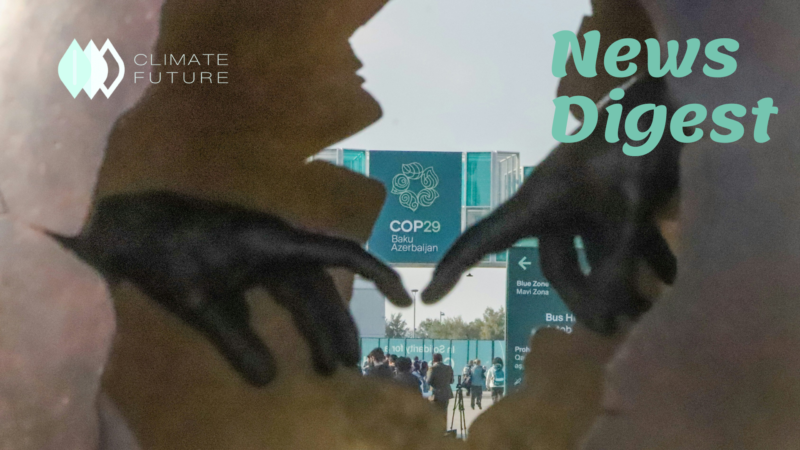COP29: Energy transition must not trigger a “stampede of greed” that crushes the poor

© UNICEF/Patrick Brown | Children work at a mine in South Kivu in the Democratic Republic of the Congo.
UN Secretary-General António Guterres has underlined the necessity for a fair and just energy transition. He emphasized how developing nations could profit from the rising demand for vital minerals for renewable energy technology. But he cautioned about the dangers of repeating the same mistakes again, including environmental harm, human rights violations, and exploitation. A Panel on Critical Energy Transition Minerals was formed by the UN to address these issues. In its most recent report, the Panel offers five practical suggestions and seven voluntary principles to guarantee a fair and just transition. These include maximizing value addition in developing nations with abundant resources, fostering accountability, and empowering communities. A High-Level Expert Advisory Group will be formed by the UN to expedite action on important economic issues like value addition, benefit sharing, and fair trade. A worldwide framework for accountability, transparency, and traceability will also be put into place to promote ethical production and safeguard the environment and human rights. Guterres urged all parties involved—governments, businesses, and civil society—to come together and cooperate in order to accomplish a fair and just energy transition. Involving local communities, indigenous peoples, developing nations, and other pertinent parties in this process is crucial. By acting swiftly and putting justice and equity first, the world community can take advantage of the energy transition’s opportunities while avoiding its past mistakes.
The Philippines brace for more storms amid devastating typhoon season

© ADB | A boy drags possessions through the flooded streets of Manila in the aftermath of a typhoon.
Twelve typhoons have hit the Philippines so far this year, including the most recent two storms, Kristine and Leon. Millions of people, especially children, have been devastated by these extreme weather disasters. An already precarious water and sanitation situation has been made worse by the typhoons, raising fears of disease breakouts. Affected communities are receiving vital supplies including water filtration systems and hygiene kits from UNICEF and its partners. With millions of children’s educations stopped and many schools ruined, education has also been severely disrupted. Restoring educational services is a top priority for UNICEF, which is also supplying impacted schools with supplies. Typhoons are predicted to occur more frequently and with greater intensity as the Philippines becomes more vulnerable to climate change. The government and humanitarian groups are putting in an endless effort to help and aid impacted communities despite the difficulties.
Over 2 billion in cities will be exposed to 0.5ºC rise by 2040

© UNICEF/Farhana Satu | A busy street in the Bangladeshi capital, Dhaka.
When it comes to developing climate-resilient systems, cities around the world are severely underfunded. The $831 billion in funding that is currently available is significantly less than the anticipated $4.5 to $5.4 trillion that is required annually. Due to this deficiency, cities are more susceptible to the effects of climate change, especially when it comes to their most vulnerable citizens. Disasters related to climate change disproportionately affect slums and informal settlements, which are frequently found in environmentally sensitive locations and lack protective infrastructure. In addition to being more vulnerable, these communities are also less likely to get assistance following such incidents. The problem is made worse by the loss of green places brought on by urban growth. Greening initiatives and other climate interventions can occasionally cause gentrification, which drives out low-income locals. Cities have a vital role to play in combating climate change despite these obstacles. Green areas, renewable energy, and sustainable infrastructure are ways that cities may lower greenhouse gas emissions and prepare for the effects of climate change. Linking climate action to more general development objectives, like public health and poverty alleviation, is crucial to solving the climate challenge. Cities may create a more resilient and just future by putting the needs of marginalized people first and making investments in sustainable urban development.
COP29: Push for agreement on a new climate finance deal “right from the start”

UN Climate Change/Habib Samadov
Baku, Azerbaijan, is hosting the 29th Conference of the Parties (COP29) to the UN Framework Convention on Climate Change (UNFCCC). Addressing the pressing issue of climate change and securing a new global climate finance goal to replace the expiring $100 billion pledge are the main objectives of this conference. With record-breaking temperatures and catastrophic weather events affecting communities around the world, UN Secretary-General António Guterres has issued a “Red Alert” on the increasing climate disaster. He underlined that in order to slow down climate change and prepare for its effects, swift and decisive action is required.
Countries at COP29 are anticipated to:
- Operationalize the loss and damage fund: As decided upon at COP28, this fund will give money to nations that are at risk of climate-related catastrophes.
- To meet the Paris Agreement’s 1.5°C temperature target, nations are required to submit revised climate targets that are more aggressive.
- Complete the implementation guidelines for Article 6 of the Paris Agreement so that nations can work together on climate mitigation strategies, including carbon market systems.
- Increased transparency in climate action: To monitor their progress in cutting emissions and preparing for climate change, countries will have to submit transparency reports every two years.
- Identify a new global climate finance objective that will help developing nations cut their emissions and prepare for climate change by raising a sizable amount of money.
All countries must work together to confront the climate issue and create a sustainable future if COP29 is to be successful.
References
https://news.un.org/en/story/2024/11/1156881
https://news.un.org/en/story/2024/11/1156866



